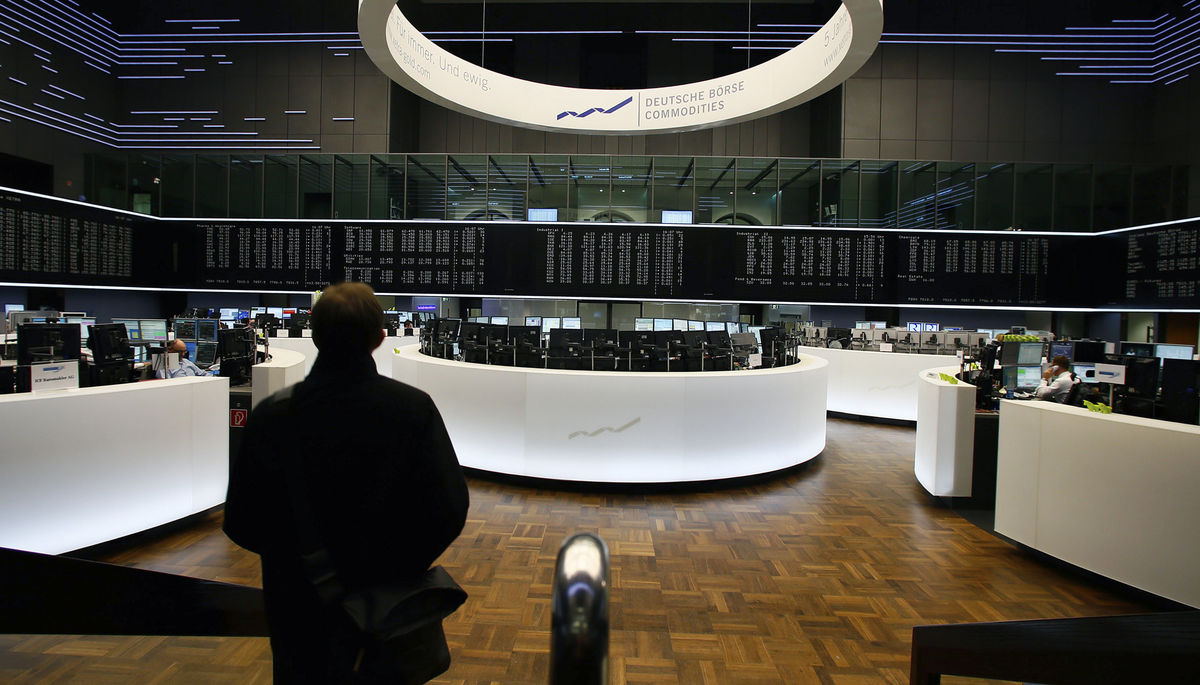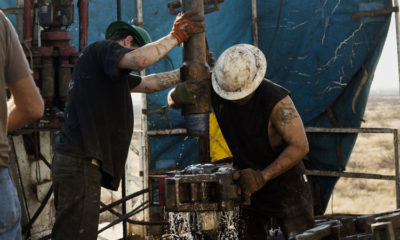Markets
Stock Market Plummets as Optimism Wanes
Published
9 years agoon

After rallying for five day the previous week following investors drive to build position ahead of probable positive earnings release by listed companies, the Nigerian equities market closed in the red last week as optimism waned, forcing anxious investors to book profit.
The equities market had closed positive the previous week with a 5.05 per cent gain after a five-day rally which strengthened benchmark indicator by 1,187.92 points. Both the NSE-ASI and market capitalisation closed higher ending the week at 24,689.69pt and N8.491trillion respectively. Market sentiment was positive with renewed active bargain tendency displayed toward large and medium cap stock in anticipation of positive earnings release and likelihood of dividend announcement.
However, the market was volatile in most of the trading days last week as supply outstripped demand while most investors maintained cautious approach.
At the close of trades, the Nigerian Stock Exchange All-Share Index (ASI) and market capitalisation depreciated by 1.04 per cent to close the week at 24,432.51 and N8.403 trillion respectively.
Similarly, all other Indices finished lower during the week, with the exception of the NSE Main Board Index, NSE Banking Index, NSE Consumer Goods Index and NSE Oil and Gas and that appreciated by 0.95 per cent, 0.04 per cent, 0.21 per cent and 3.30 per cent respectively, while the NSE ASeM index closed flat.
Meanwhile, analysts at InvestmentOne Limited have said that the market will remain volatile and enjoined investors to tread cautiously and take position in quality name ahead of earning season.
“With the market breadth index closing negative, we expect market to be volatile in the coming session. Hence, we reiterate our earlier stance for position-building in quality name for a medium to long term horizon,” they stated.
Daily Performance Analysis
Trading on the Exchange had commenced on a positive note last Monday gaining 0.56 per cent corresponding to a N47 billion increase in market capitalisation to N8.54 trillion. The session looked likely to close in the red but a late rally saw the index rise from 24,381.47, during intraday, to close at 24,827.50.
There were 13 stocks that appreciated on the day against 25 losers. The session was driven by a late rally in Dangote Cement Plc (3.75 per cent) in addition to Seplat Plc (3.65 per cent) and Guaranty Trust Bank Plc (0.73 per cent). These performances offset the declines in Nestle Nigeria Plc (3.60 per cent), Zenith Bank Plc (4.92 per cent) and FBN Holdings Plc (4.07 per cent). Consequently, the Industrial and Oil and Gas sectors rose by 2.00 per cent and 0.62 per cent respectively, while the Consumer Goods and the Banking sectors shed 1.37 per cent and 0.97 per cent respectively.
The market depreciated Tuesday after trending upwards for six days. The NSE ASI decreased by 1.26 per cent to close at 24,514.91. The depreciation recorded in the share prices of Dangote Cement Plc, Nigerian Breweries Plc, Nestle Nigeria Plc, Zenith Bank Plc and Guaranty Trust Bank Plc, were mainly responsible for the loss recorded in the index. Similarly, the market capitalisation depreciated by 1.26 per cent to close at N8.43 trillion, compared with the appreciation of 0.56 per cent recorded the prior day to close at N8.54 trillion.
The market declined further on Wednesday with the NSE ASI decreasing by 1.87 per cent to close at 24,056.12. Similarly, the market capitalisation depreciated by 1.87 per cent to close at N8.27 trillion. The depreciation recorded in the share prices of Dangote Cement Plc, Guinness Nigeria Plc, Nestle Nigeria Plc, Unilever Nigeria Plc and Guaranty Trust Bank Plc caused the loss recorded in the index.
However, despite the low market activity witnessed on Thursday, the NSE ASI rebounded appreciating by 0.85 per cent to close at 24,261.69.
The appreciation resulted from rise recorded in the share prices of Nigerian Breweries Plc, Guinness Nigeria Plc, Guaranty Trust Bank Plc, FBN Holdings Plc and Seplat Plc. Similarly, the market capitalisation appreciated by 0.85 per cent to close at N8.34 trillion, compared with the depreciation of 1.87 per cent recorded the previous day to close at N8.27 trillion. The total value of stocks traded on the floors of the NSE on the day was N959.77 million, down by 50.84 per cent from N1.95 billion traded the previous day.
The market closed positive for the second consecutive day last Friday. It rose 0.70 per cent or 170.82 points to 24,432.51 points. This represented a N58 billion increase in market capitalization to N8.40 trillion. The positive outcome was driven by gains in Nestle Nigeria Plc (7.69 per cent), Nigerian Breweries Plc (0.69 per cent), Seplat Plc (5.00 per cent) and some banking stocks: Guaranty Trust Bank Plc, (1.02 per cent) and Zenith Bank Plc (0.97 per cent) offsetting the loss in FBN Holdings Plc (3.56 per cent), ETI Plc (0.95 per cent) and Diamond Bank Plc (6.63 per cent).
In addition, there were improvements in investor sentiment as Nestle Nigeria Plc led the 22 stocks that gained compared to Portland Paints Plc (9.43 per cent), which was the biggest loser of the 16 stocks that declined. Industrial was the only sector to end the day in the red, shedding 0.02 per cent while Consumer Goods climbed 2.36 per cent. The Oil and Gas and Banking sectors finished the session up 1.09 per cent and 0.32 per cent respectively. Market activity was mixed last Friday with total volume increasing by 45 per cent while total value dropped 4 per cent as 172 million units of shares worth N925 million were exchanged.
Market Turnover
Meanwhile, investors traded 1.202 billion shares worth N9.641 billion in 13,712 deals were traded last week in contrast to a total of 1.407 billion shares valued at N17.277 billion that exchanged hands the previous week in 14,914 deals.
The Financial Services Industry led the activity chart with 1.005 billion shares valued at N6.471 billion traded in 8,313 deals; thus contributing 83.66 per cent and 67.12 per cent to the total equity turnover volume and value respectively.
The Consumer Goods Industry followed with 54.333 million shares worth N2.114 billion in 2,365 deals. The third place was occupied by the Conglomerates Industry with a turnover of 45.977 million shares worth N184.205 million in 518 deals.
Trading in the top three equities namely – Zenith International Bank Plc, Guaranty Trust Bank Plc and United Bank for Africa Plc, accounted for 500.360 million shares worth N5.449 billion in 4,011 deals, contributing 41.63 per cent and 56.52 per cent to the total equity turnover volume and value respectively.
Also traded during the week were a total of 93,518 units of Exchange Traded Products (ETPs) valued at N1.158 million executed in 48 deals, compared with a total of 115,641 units valued at N1.285 million transacted the previous week in 28 deals.
A total of 150,000 units of Federal Government Bonds valued at N169.326 million were traded in 2 deals compared to a total of 39,340 units of both State (1) and Federal Government Bonds (2) valued at N44.246 million transacted the previous week in 3 deals.
Gainers and Losers
In terms of price movement, a total of 22 equities appreciated in price during the week, lower than 26 equities of the previous week. Thirty-seven equities depreciated in price, higher than 30 equities of the previous week, while 131 equities remained unchanged, lower than 134 equities recorded in the previous week.
The top 10 gainers were: Seplat Plc (N50.37), Glaxo Smithkline Plc (N3.28), Ecobank Transnational Plc (85 kobo), NAHCO Plc (49 kobo), May & Baker Plc (14 kobo), NPF Micro Finance Bank Plc ( nine kobo) Tiger Branded Consumer Plc (six kobo), UAC Nigeria (97 kobo), Airline Services and Logistics (10 kobo) and Cutix (seven kobo).
On the other hand, the top 10 losers included: NNFM Plc (70 kobo), Portland Paint Plc (38 kobo), Oando Plc (30 kobo), Caverton Plc (17 kobo), Diamond Bank (13 kobo) Honeywell Flour Plc (12 kobo), Learn Africa Plc ( nine kobo), Unity Bank Plc, Continental Reinsurance Plc (eight kobo apiece ), and Neimeth Plc (six kobo).
ThisDay
Is the CEO and Founder of Investors King Limited. He is a seasoned foreign exchange research analyst and a published author on Yahoo Finance, Business Insider, Nasdaq, Entrepreneur.com, Investorplace, and other prominent platforms. With over two decades of experience in global financial markets, Olukoya is well-recognized in the industry.

You may like
-
Nigeria Joins BRICS as Partner Country, Strengthening Global South Cooperation
-
70 Million Poorest of The Poor Nigerians To Get N75,000 From FG
-
Nigeria Surpasses OPEC Quota with 1.51 Million bpd, Targets 2.06 Million in 2025
-
Global Investors Commit $7.6 Billion to Nigeria’s Development at AIF 2024
-
Nigeria-China Trade Strengthened as Grimaldi Introduces Direct Shipping Line
-
Nigeria’s GDP Records 3.46% Growth in Q3 Spurred by Non-Oil Sector













